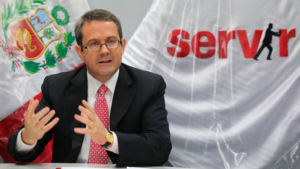Categoría: justicia
Policía Federal pone en su lugar a Policías Estatales abusivos en México
Presidente de Servir renunció: Indulto quiebra los principios del Estado
Juan Carlos Cortés presentó su carta de renuncia a la premier Mercedes Aráoz. “Me debo a mi mismo y a mi familia la coherencia y el respeto a mis propios valores morales”, dijo.

Juan Carlos Cortes, ex presidente ejecutivo de Servir. Imagen: https://prod.media.larepublica.pe/720×405/larepublica/imagen/2017/12/26/noticia-funcionario-servir.jpg
Juan Carlos Cortés Carcelén, presidente ejecutivo y miembro del Consejo Directivo de la Autoridad Nacional del Servicio Civil, dio a conocer este martes su renuncia irrevocable al cargo en un oficio dirigido a la presidenta del Consejo de Ministros, Mercedes Aráoz.
Según argumenta el funcionario, su decisión es una respuesta que condice a los principios que defiende y que no convergen con el indulto humanitario que otorgó el presidente Pedro Pablo Kuczynski al exdictador Alberto Fujimori.
“Considero que lo que ha sucedido el día 24 de diciembre (…) quiebran no solo las bases del Estado de Derecho, sino principalmente esos principios que estamos obligados como funcionarios públicos a promover y defender”, expresó.
Como se recuerda, a pocas horas de la Nochebuena, el mandatario otorgó el indulto y derecho de gracia a Fujimori, quien venía cumpliendo una condena de 25 años por los delitos de La Cantuta, Barrios Altos y secuestros al periodista Gustavo Gorriti y el empresario Samuel Dyer.
“En mi vida como servidor del Estado me he regido por principios éticos que hoy se sienten socavados y me obligan a tomar esta decisión. Me debo a mi mismo y a mi familia la coherencia y el respeto a mis propios valores morales”, acotó.
En el transcurso del día han presentado sus renuncias otros funcionarios del Ministerio de Justiciapor estar disconformes con el otorgamiento del beneficio presidencial.
En: larepublica
Alfredo Barnechea – Mensaje sobre el Indulto a Alberto Fujimori
Ex Socios de Odebrecht son Trasladados a Carceleta del Poder Judicial
Luego que el Primer Juzgado de Investigación Preparatoria dictara 18 meses de prisión preventiva contra cuatro ex representantes de las empresas Graña y Montero, JJ Camet e ICCGSA, socias de la constructora brasileña Odebrecht por presuntamente haber pagado una coima para la ejecución de los tramos II y III de la Carretera Interoceánica. Esta mañana, los empresarios fueron trasladados a la carceleta del Poder Judicial.
Fernando Camet Piccone, José Castillo Dibós, José Graña Miró Quesada y Hernando Graña Acuña fueron trasladados a la carceleta del INPE luego de haber sido denunciados por la Fiscalía por los delitos de colusión y lavado de activos tras ser investigados por el presunto pago de sobornos al expresidente Alejandro Toledo.
Y es que los implicados presuntamente habrían transferido 15 millones de dólares de las utilidades que obtuvieron sus firmas. Cabe resaltar, que el juez Richard Concepción Carhuancho, dictó arresto domiciliario para Gonzalo Ferraro ya que se encuentra internado en la Clínica Angloamericana por encontrarse mal de salud.
Mas informacion en: panamericana
Juez de Rhode Island, considerado “héroe” en redes sociales por sus veredictos
Malta car bomb kills Panama Papers journalist Daphne Caruana Galiza
Daphne Caruana Galizia, a blogger whose investigations focused on corruption, was described as a ‘one-woman WikiLeaks’
The journalist who led the Panama Papers investigation into corruption in Malta was killed on Monday in a car bomb near her home.
Daphne Caruana Galizia died on Monday afternoon when her car, a Peugeot 108, was destroyed by a powerful explosive device which blew the vehicle into several pieces and threw the debris into a nearby field.
A blogger whose posts often attracted more readers than the combined circulation of the country’s newspapers, Caruana Galizia was recently described by the Politico website as a “one-woman WikiLeaks”. Her blogs were a thorn in the side of both the establishment and underworld figures that hold sway in Europe’s smallest member state.
Her most recent revelations pointed the finger at Malta’s prime minister, Joseph Muscat, and two of his closest aides, connecting offshore companies linked to the three men with the sale of Maltese passports and payments from the government of Azerbaijan.
No group or individual has come forward to claim responsibility for the attack.
Malta’s president, Marie-Louise Coleiro Preca, called for calm. “In these moments, when the country is shocked by such a vicious attack, I call on everyone to measure their words, to not pass judgment and to show solidarity,” she said.
After a fraught general election this summer, commentators had been fearing a return to the political violence that scarred Malta during the 1980s.
In a statement, Muscat condemned the “barbaric attack”, saying he had asked police to reach out to other countries’ security services for help identifying the perpetrators.
“Everyone knows Ms Caruana Galizia was a harsh critic of mine,” said Muscat at a hastily convened press conference, “both politically and personally, but nobody can justify this barbaric act in any way”.
Muscat announced later in parliament that FBI officers were on their way to Malta to assist with the investigation, following his request for outside help from the US government.
The Nationalist party leader, Adrian Delia – himself the subject of negative stories by Caruana Galizia – claimed the killing was linked to her reporting. “A political murder took place today,” Delia said in a statement. “What happened today is not an ordinary killing. It is a consequence of the total collapse of the rule of law which has been going on for the past four years.”
Read more at: theguardian
Perú: Despiden a empleado por insultar a su jefe en Facebook
El trabajador había usado calificativos de grueso calibre para despotricar contra su jefe.
https://youtu.be/q_tjAsMRZB4
Marca un precedente. La Segunda Sala de Derecho Constitucional y Social Transitoria declaró infundada la demanda de un trabajador que fue despedido por insultar a su jefe en Facebook.
El colaborador identificado como Wellington Douglas Ramírez Chahua hizo la demanda por despido fraudulento en contra de la empresa Tecnología Textil SA, ubicada en San Juan de Lurigancho, pero fue declarada infundada e inapelable.
Siga leyendo en: peru21
